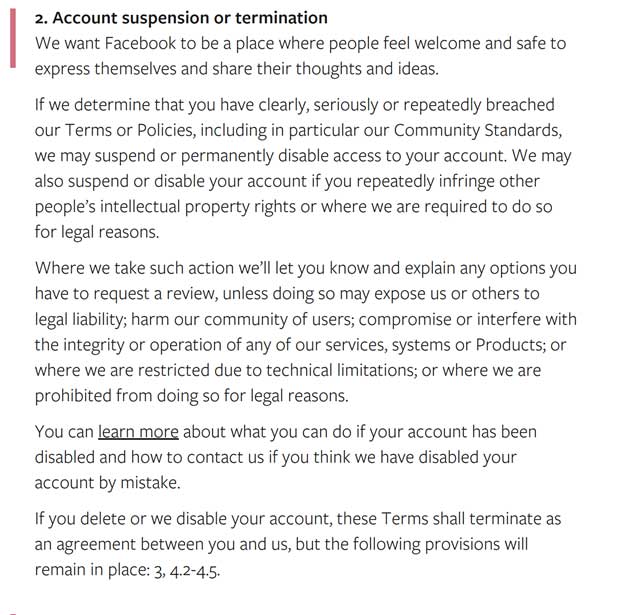A termination clause is a critical part of protecting a business in case of user misuse, and it belongs in your terms and conditions agreement.
But they can also be found in other legal agreements, like employment contracts, rental agreements, and construction or commercial contracts.
In this article, I explain what a termination clause is, why you might need one, and how to write one for your business.
What is a Termination Clause?
A termination clause outlines the guidelines for user termination on a website or app.
It can include:
- User behavior expectations,
- Details on the termination process,
- Account termination consequences, and more.
Terms and conditions, also known as terms of service or terms of use, often have a termination clause. Terms and conditions are a contract between a website and its users. This contract is used to state the rules of your website or business for your users.
You can list details on user behavior expectations in the termination clause or elsewhere in your terms and conditions.
Do I Need a Termination Clause?
You are not legally required to have a termination clause; however, if you are a website or business owner, it is in your own interest to have one.
A termination clause can help protect your business from unacceptable user behavior.
But a termination clause alone is not necessarily enough to keep your business protected. This is usually just one section of a website’s terms and conditions agreement.
The readt of the terms and conditions, as a whole, outline all of the rules of use for a website or business. It can also be used to help protect your intellectual property.
Other legal policies, like privacy policies and return policies, are also important tools for keeping your business protected.
A return policy can help set clear return expectations for your users, including details on return procedures, shipping costs, cancellations, and more.
Termination Sample Clauses
Your termination clause may look much different than one from another website.
However, some common termination sample clauses include language like the following:
- “If we terminate or suspend your account for any reason, you are prohibited from registering and creating a new account.”
- “We reserve the right to, in our sole discretion and without notice or liability, deny access to and use of the site.”
- “We reserve the right to take appropriate legal action, including without limitation pursuing civil, criminal, and injunctive redress.”
You can read other websites’ termination clauses to get a better understanding of how they are used to protect a business.
Review these examples to learn more.
Example 1: Facebook’s Termination Clause
Facebook includes their termination clause in their Terms of Service. It states why Facebook might terminate an account and how the termination process will work.

Example 2: Discord’s Termination Clause
Discord’s termination clause is also found in their Terms of Service. It includes the process for a user to terminate their account, as well as how the company might terminate a user’s account. They also include some potential consequences of account termination.

Example 3: Apple’s Termination Clause
Apple’s termination clause can be found in their terms and conditions. It outlines the termination process if a user fails to comply with any part of the agreement.

How to Write a Termination Clause
Here are a few ways to write a termination clause for your terms and conditions:
- Write them yourself, but be careful not to copy another company’s or website’s legal agreements. Copying someone else’s legal agreements could qualify as copyright infringement. Additionally, other websites’ legal agreements are not tailored to your specific website and may not provide adequate legal protection.
- Use a terms and conditions template.
- Hire a lawyer to draft or review your termination clause or your entire terms and conditions agreement.
- Use a terms and conditions generator to help you draft terms and conditions with a termination clause.
When drafting your termination clause, consider your answers to the following questions:
- What user behavior is unacceptable for the use of your website or business?
- What will the termination process look like?
- What are the consequences of termination?
Once you’ve written your termination clause, you’ll want to add it to your terms and conditions. You should display your terms and conditions in a visible and accessible place on your website.
By creating a termination clause, you’ll be protecting your website against potential user misbehavior.
If you need help drafting your terms and conditions, start with Termly’s Terms and Conditions Generator.

